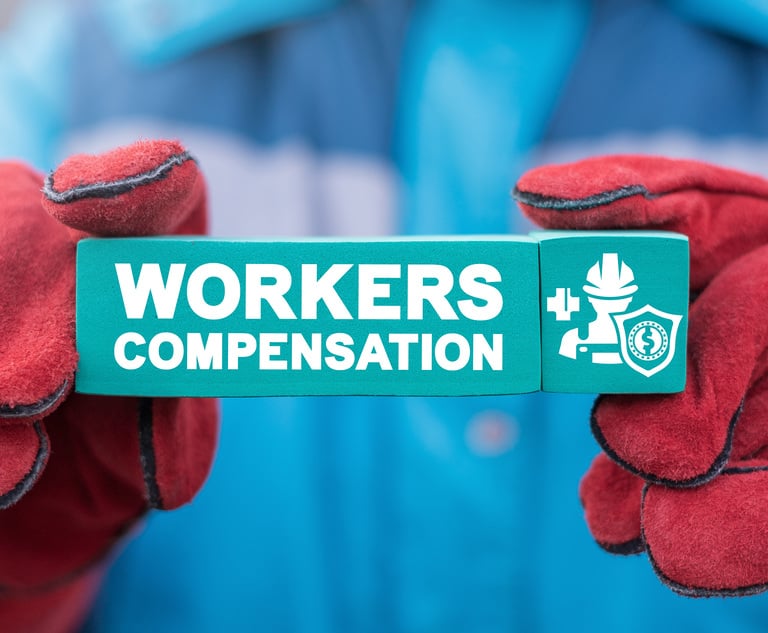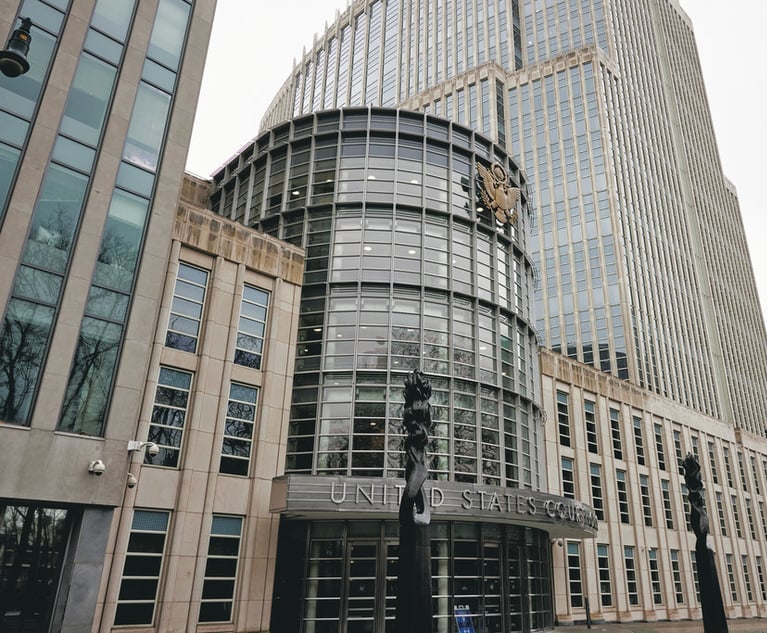Year in Review: Important Long-Tail Claim and Malicious Prosecution Cases from 2019
Courts in 2019 made several groundbreaking decisions on long-tail claims, late notice, and malicious prosecutions. Read about them here!
January 29, 2020 at 10:00 AM
7 minute read
The original version of this story was published on Law.com
 Connecticut Supreme court building in Hartford.
Connecticut Supreme court building in Hartford.
These top cases from 2019 involve two on long-tail claims and interestingly two on malicious prosecution. The increase in wrongful conviction litigation has given rise to new insurance coverage issues. In 2019, several courts considered the insurance triggers for claims of wrongful convictions and malicious prosecution under commercial general liability policies.
The Connecticut Supreme Court Decides Significant Coverage Issues.
The Connecticut Supreme Court affirmed that state law permits an "unavailability of insurance" rule, under which a policyholder is not liable to pay a share of its own defense and indemnity costs for periods when insurance for a certain risk was unavailable in the marketplace. Instead, those costs must be divvied up on a proportional, or "pro rata," basis among insurers that issued policies covering the risk in other periods. The court applied the rule in Vanderbilt because the insured was unable to obtain coverage after 1985 for individuals' claims for asbestos injuries allegedly caused by exposure to the company's industrial talc. The court also affirmed that an "occupational disease" exclusion in some of Vanderbilt's policies bars coverage not only for asbestos claims brought by the company's own workers, but also those brought by people who were allegedly sickened by Vanderbilt's products in the "course of their work for other employers."
Hunton insurance recovery partner, Syed Ahmad, explained that, "as with other decisions breaking new ground, this case will naturally be the focus for future battles in other states about the scope of this and similar exclusions. Time will tell if what the court did here will be the start of a trend, with other courts following suit, or if the case will turn out to be an outlier with other states going their separate ways." This case is R.T. Vanderbilt Co., Inc. v. Hartford Accident & Indem. Co., 216 A.3d 629 (Conn. 2019).
Third Circuit Limits Pennsylvania's Kvaerner Decision; Unexpected and Unintended Injury May Constitute an "Occurrence" Under Pennsylvania Law.
The Third Circuit ruled that differing "occurrence" definitions can have materially different meanings in the context of whether product defect claims constitute an "occurrence" triggering coverage under general liability insurance policies. The coverage dispute arose from an underlying action in which a window manufacturer alleged that, between 2000 and 2010, Sapa sold roughly 28 million defective aluminum window extrusions. The window manufacturer alleged that the extrusions, which are metal frames that hold glass window panes in place, began to oxidize and break down shortly after they were installed, causing Marvin to incur substantial costs to fix and replace them. Marvin sued Sapa in 2010 in Minnesota federal court, and the parties settled in 2013. Sapa sought coverage for the settlement from its eight general liability insurers for the period implicated by Marvin's allegations. The insurers denied coverage and Sapa brought suit in the Middle District of Pennsylvania. The district court held that there was no coverage available under any of Sapa's 28 liability policies because Marvin's claims did not arise from an "occurrence" that triggered coverage.
The Third Circuit held that product claims against Sapa may be covered under policies that define an "occurrence" as an accident resulting in bodily injury or property damage "neither expected nor intended from the standpoint of the insured." However, the court affirmed that coverage was not triggered under policies lacking the "expected" or "intended" limitation, reasoning that, under those policies, there was no question that the intentional manufacturing of Sapa's product was too foreseeable to amount to an "accident."
The Third Circuit's ruling in Sapa reaffirms a fundamental rule of contract construction—that contracts, including insurance policies, must be interpreted based on their specific language. The case is Sapa Extrusions, Inc. v. Liberty Mut. Ins. Co., 939 F.3d 243 (3d Cir. 2019).
New Illinois Supreme Court Trigger Rule for CGL Personal Injury "Offenses" Could Have Costly Consequences for Policyholders.
The Illinois Supreme Court's decision in Sanders v. Illinois Union Insurance Co. announced the standard for triggering general liability coverage for malicious prosecution claims under Illinois law. The Sanders case arose out of the wrongful conviction of Rodell Sanders in 1994 by the City of Chicago Heights. Mr. Sanders sought recompense for, among other things, malicious prosecution through a federal civil rights action against the city. In its decision, the court construed what appears to be a policy ambiguity against the policyholder in spite of the longstanding rule of contra proferentem, limiting coverage to policies in place at the time of the wrongful prosecution, and not the policies in effect when the final element of the tort of malicious prosecution occurred (i.e., the exoneration of the plaintiff). The case is Sanders v. Ill. Union Ins. Co., 2019 IL 124565.
Read ICLC's expert coverage of this case here.
Missouri Appeals Court Says Malicious Prosecution Injury Occurs in Each Year of Incarceration; Counter to the Illinois Supreme Court's Recent Sanders Decision.
In contrast to Sanders, the Missouri Court of Appeals, Western District, found only weeks later in Ferguson that a public entity liability policy covered the injuries sustained by a man who had been wrongfully convicted, notwithstanding that the policy was issued years after the relevant prosecution. The case arose out of the 2005 wrongful conviction of Ryan Ferguson by the City of Columbia in Boone County, Missouri. Ferguson was incarcerated from 2005 until his release in 2013. After his release, Ferguson sued Columbia for violations of his constitutional rights and malicious prosecution. Columbia and one of its insurers entered into a partial settlement with Ferguson for $2.75 million and Ferguson ultimately was awarded over $11 million following a bench trial. As a judgment creditor, Ferguson sought equitable garnishment against two of Columbia's insurers that had denied coverage. The insurers did not dispute liability but challenged the availability of coverage on the ground that none of the policies were in place at the time of Ferguson's wrongful conviction.
The court concluded that the injuries sustained as a result of a malicious prosecution are continuous and ongoing and, consequently, Ferguson sustained "personal injury" during each year he was incarcerated as long as the injury was sustained during the policy period. The court further held that the insurers' policies "plainly and unambiguously [provide] coverage for injuries sustained during the policy period even though the wrongful act occurs before the policy period," and since Ferguson was found to suffer emotional distress and mental anguish during each year of his incarceration, he suffered "bodily injury" each year. The case is Ferguson v. St. Paul Fire & Marine Ins. Co., No. WD82090, 2019 WL 6703892 (Mo. Ct. App. Dec. 10, 2019).
With respect to claims like Sanders and Ferguson, the National Registry of Exonerations, which compiles statistics concerning exonerations from wrongful convictions, states that exonerations have grown tremendously since 1989, the first year of the database. Similarly, jury awards for wrongful convictions have also generally risen year over year. These conditions, combined with the tendency of policyholders of yesteryear to procure less coverage than policyholders of today and the uncertainties of even locating or obtaining coverage under legacy policies, creates a perfect storm that could leave the policyholder on the hook for a significant portion of an award for malicious prosecution.
(c) 2020 Hunton Andrews Kurth. All rights reserved. Republished here with permission.
This content has been archived. It is available through our partners, LexisNexis® and Bloomberg Law.
To view this content, please continue to their sites.
Not a Lexis Subscriber?
Subscribe Now
Not a Bloomberg Law Subscriber?
Subscribe Now
NOT FOR REPRINT
© 2025 ALM Global, LLC, All Rights Reserved. Request academic re-use from www.copyright.com. All other uses, submit a request to [email protected]. For more information visit Asset & Logo Licensing.
You Might Like
View All
Total Incapacity Benefits Are Available Postretirement, Connecticut Supreme Court Says
4 minute read
Insurance Company Sues Over 180 Health Care Providers for Fraud Under RICO
3 minute read
Amid Growing Litigation Volume, Don't Expect UnitedHealthcare to Change Its Stripes After CEO's Killing
6 minute readLaw Firms Mentioned
Trending Stories
Who Got The Work
J. Brugh Lower of Gibbons has entered an appearance for industrial equipment supplier Devco Corporation in a pending trademark infringement lawsuit. The suit, accusing the defendant of selling knock-off Graco products, was filed Dec. 18 in New Jersey District Court by Rivkin Radler on behalf of Graco Inc. and Graco Minnesota. The case, assigned to U.S. District Judge Zahid N. Quraishi, is 3:24-cv-11294, Graco Inc. et al v. Devco Corporation.
Who Got The Work
Rebecca Maller-Stein and Kent A. Yalowitz of Arnold & Porter Kaye Scholer have entered their appearances for Hanaco Venture Capital and its executives, Lior Prosor and David Frankel, in a pending securities lawsuit. The action, filed on Dec. 24 in New York Southern District Court by Zell, Aron & Co. on behalf of Goldeneye Advisors, accuses the defendants of negligently and fraudulently managing the plaintiff's $1 million investment. The case, assigned to U.S. District Judge Vernon S. Broderick, is 1:24-cv-09918, Goldeneye Advisors, LLC v. Hanaco Venture Capital, Ltd. et al.
Who Got The Work
Attorneys from A&O Shearman has stepped in as defense counsel for Toronto-Dominion Bank and other defendants in a pending securities class action. The suit, filed Dec. 11 in New York Southern District Court by Bleichmar Fonti & Auld, accuses the defendants of concealing the bank's 'pervasive' deficiencies in regards to its compliance with the Bank Secrecy Act and the quality of its anti-money laundering controls. The case, assigned to U.S. District Judge Arun Subramanian, is 1:24-cv-09445, Gonzalez v. The Toronto-Dominion Bank et al.
Who Got The Work
Crown Castle International, a Pennsylvania company providing shared communications infrastructure, has turned to Luke D. Wolf of Gordon Rees Scully Mansukhani to fend off a pending breach-of-contract lawsuit. The court action, filed Nov. 25 in Michigan Eastern District Court by Hooper Hathaway PC on behalf of The Town Residences LLC, accuses Crown Castle of failing to transfer approximately $30,000 in utility payments from T-Mobile in breach of a roof-top lease and assignment agreement. The case, assigned to U.S. District Judge Susan K. Declercq, is 2:24-cv-13131, The Town Residences LLC v. T-Mobile US, Inc. et al.
Who Got The Work
Wilfred P. Coronato and Daniel M. Schwartz of McCarter & English have stepped in as defense counsel to Electrolux Home Products Inc. in a pending product liability lawsuit. The court action, filed Nov. 26 in New York Eastern District Court by Poulos Lopiccolo PC and Nagel Rice LLP on behalf of David Stern, alleges that the defendant's refrigerators’ drawers and shelving repeatedly break and fall apart within months after purchase. The case, assigned to U.S. District Judge Joan M. Azrack, is 2:24-cv-08204, Stern v. Electrolux Home Products, Inc.
Featured Firms
Law Offices of Gary Martin Hays & Associates, P.C.
(470) 294-1674
Law Offices of Mark E. Salomone
(857) 444-6468
Smith & Hassler
(713) 739-1250











